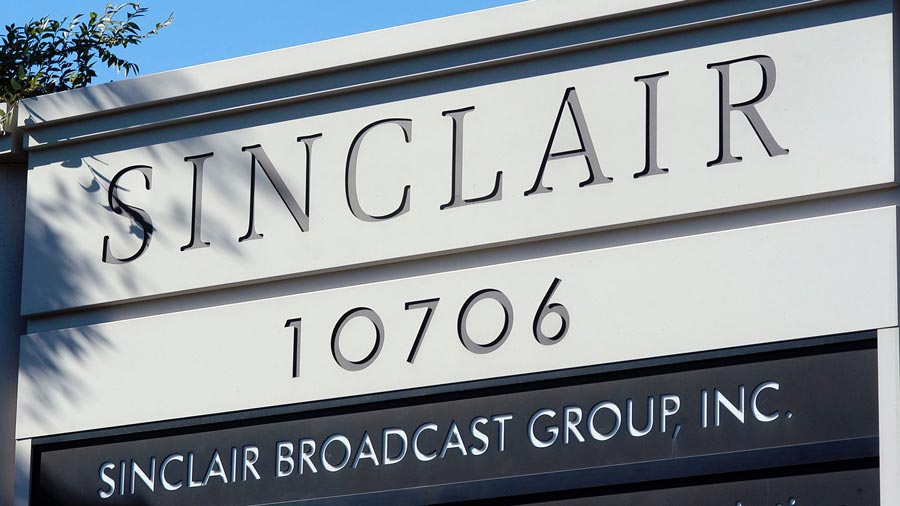Sinclair Made Last Ditch Effort to Head Off FCC Hearing

The smarter way to stay on top of broadcasting and cable industry. Sign up below
You are now subscribed
Your newsletter sign-up was successful
FCC chair Ajit Pai phoned Sinclair EVP and general counsel Barry Faber midweek (July 18) to let the company know that just withdrawing the three TV station sale applications that appeared to be sweetheart deals was not going to head off an administrative hearing on the proposed Tribune merger, with which the FCC had big problems.
But Faber told Pai the company was not planning to cancel the deal last week, saying that would require board approval it did not have and signaled it should not have to because it had never hidden or mischaracterized the structure of the deal.
Sinclair tried to get the chairman to delay that hearing, according to a letter to Pai from Faber filed with the FCC, but the hearing designation order passed unanimously last week and a hearing looks certain unless Sinclair does decide to pull the plug on the deal.
Related: FCC: Sinclair Deal As Proposed Is Not in Public Interest
Pai had said in announcing his hearing proposal that it stemmed from allegations by various deal critics that Sinclair was trying to skirt FCC rules and that there were serious questions about whether the company had been truthful with the commission, with the hearing order using language like "misrepresentation" and "lack of candor."
Those, if true, could also raise the specter of license challenges to existing Sinclair stations based on character issues--licensees can't lie to the FCC.
Sinclair had cancelled the planned sale of two Texas stations to Cunningham Broadcasting and WGN Chicago to Steven Fader, a business associate of executive chairman David Smith, saying it would put the Texas stations in a trust until it found a buyer the FCC approved of, and would keep WGN.
The smarter way to stay on top of broadcasting and cable industry. Sign up below
Faber told Pai that to can the deal last week it would have had to get board approval to withdraw the entire deal application, which it did not have, and even then such a unilateral action would have violated its agreement with Tribune.
"I know that you told me yesterday that the withdrawal of these three applications would not prevent you moving forward with the HDO," Faber wrote, "but I am writing to ask you to reconsider that position (or at least delay it until you have an opportunity to more fully consider the situation," Faber wrote.
Pai didn't delay the decision, and with the vote of Commissioner Michael O'Rielly on July 18 making it unanimous, the deal was referred to the FCC's lone administrative law judge for an evidentiary hearing that could take upwards of a year. It said of the Cunningham sale: "We question the close relationship between Sinclair and Cunningham, an existing loan guarantee between Sinclair and Cunningham, and the proposed purchase price," which it said appeared to be below market.
Faber conceded that if Sinclair had not been completely truthful about the sales, just abandoning them would not eliminate that "unacceptable behavior." But he told Pai that "no evidence exists that Sinclair has mislead the FCC or been anything other than completely candid with respect to our relationships with the proposed buyers and the terms of the transaction."
But the order says Sinclair "did not fully disclose facts such as the pre-existing business relationship between Fader, Smith and Sinclair nor the full entanglements between Cunningham, Smith and Sinclair."
Related: Deal Critics to Tribune Board: Abandon Merger Or Quit
The FCC also had issues with the $60 million price tag for WGN-TV, which appeared to it, and critics, and more than one communications attorney with no dog in the fight, as a lowball figure.
"To designate our transaction for hearing based on the possibility that there may be more to the deals than meets the eyes based on the pricing and other terms that have been disclosed, would be extraordinary and unprecedented," Faber said.
Sinclair had signaled surprise at the FCC hearing order when it was first announced, and Faber echoed that with the chairman. "At no time has anyone at the FCC ever raised any concerns that Sinclair was being less than candid with the FCC or asked us to provide any back-up or further information to explain the financial aspects of the sales of the Dallas, Houston or Chicago stations."
But the relationship of Sinclair to the two buyers was well known outside the FCC and had drawn some raised eyebrows from financial analysts wondering why Sinclair had not avoided even the appearance of cozy deals with too many entangling alliances.
But Faber told Pai that had the FCC registered its concern, "we could have adequately explained to the FCC the underlying basis for the transaction terms, eliminating any concern that the deals were anything other than arm's length agreements that would have proceeded exactly as contemplated by the documentation that has been provided."
The general consensus among deal watchers on Wall Street and K Street is that Sinclair pushed the envelope with the deal structure and put the chairman in a tough position as he was being hammered by critics for allegedly favoring Sinclair with his deregulatory moves.
Appearing to take some wind out of the sales of those positing a Pai pro-Sinclair deal bias, Faber said in the letter that the company had not been allowed to meet with Pai during the transaction.
Contributing editor John Eggerton has been an editor and/or writer on media regulation, legislation and policy for over four decades, including covering the FCC, FTC, Congress, the major media trade associations, and the federal courts. In addition to Multichannel News and Broadcasting + Cable, his work has appeared in Radio World, TV Technology, TV Fax, This Week in Consumer Electronics, Variety and the Encyclopedia Britannica.

